Vietnam Business Visa: Complete Guide for International Partners
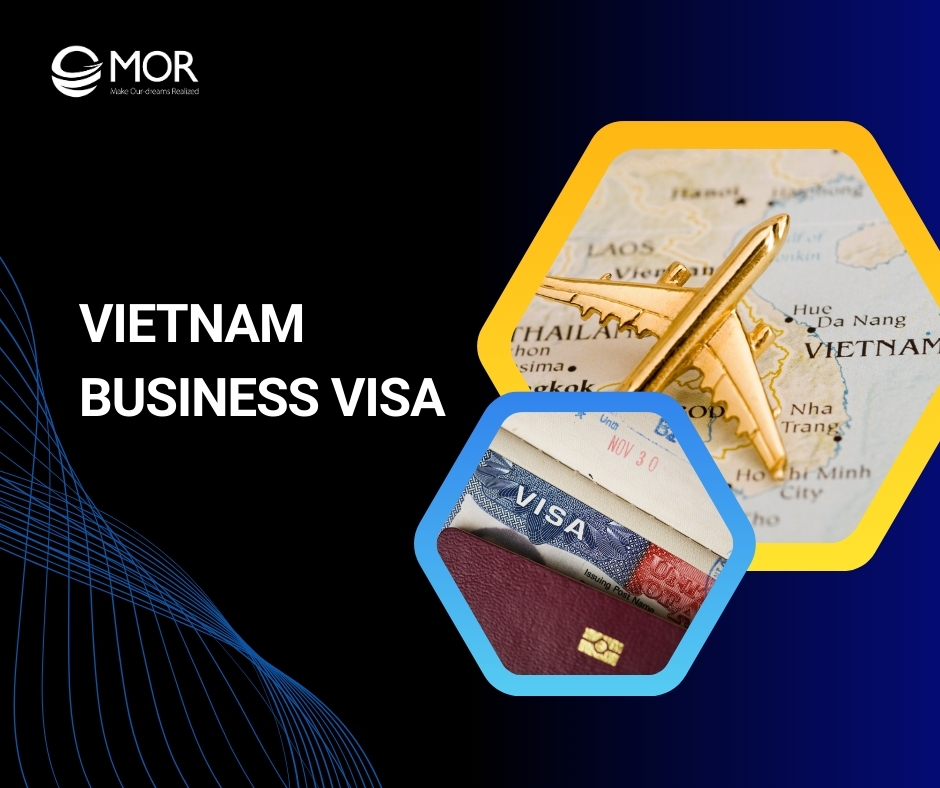
Getting a Vietnam business visa is often the first step for international partners who plan to work, negotiate, or explore opportunities in the country. Yet, many struggle to understand the detailed business visa requirements for Vietnam, from paperwork to processing fees. This MOR Software’s guide will walk you through everything you need to know to apply with confidence.
What Is Vietnam Business Visa?
A Vietnam business visa is a legal document that permits foreigners to enter the country for business-related purposes. It is required for activities such as attending conferences, negotiating contracts, exploring partnerships, or collaborating with local companies. Holding this visa shows that the traveler has legitimate business intentions during their stay in Vietnam.
Under Vietnamese law, a business visa Vietnam can be issued with different validity periods, including 1 month, 3 months, 6 months, or 1 year. Travelers may choose between single-entry or multiple-entry options depending on their needs.
For short-term cases like 1-month or 3-month visas, there is no requirement to obtain a separate work permit.
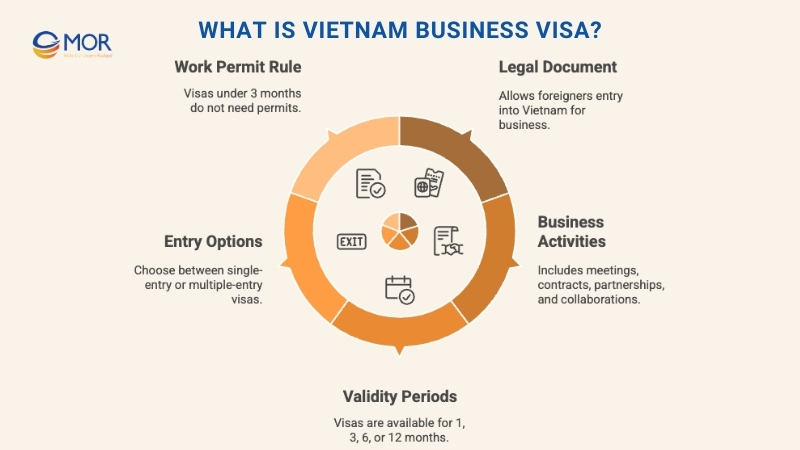
Vietnam Business Visa Overview:
| Symbols | • DN1 • DN2 |
| Duration | • 1-month Vietnam business visa • 3-month Vietnam business visa • 6-month Vietnam business visa • 1-year Vietnam business visa |
| How to Apply | • Through a Vietnamese embassy or consulate • Vietnam visa on arrival • Vietnam e-visa |
Main Types of Vietnam Business Visa
According to the revised Immigration Law of 2019, the Vietnam business visa is divided into two categories: DN1 and DN2. These visa types apply to different business activities but both require sponsorship from a recognized entity in Vietnam. Understanding these categories is important when reviewing the business visa requirements for Vietnam.
The demand for these visas reflects Vietnam’s strong investment momentum, with disbursed foreign direct investment (FDI) reaching a record US$25.35 billion in 2024, up 9.4% from the previous year.
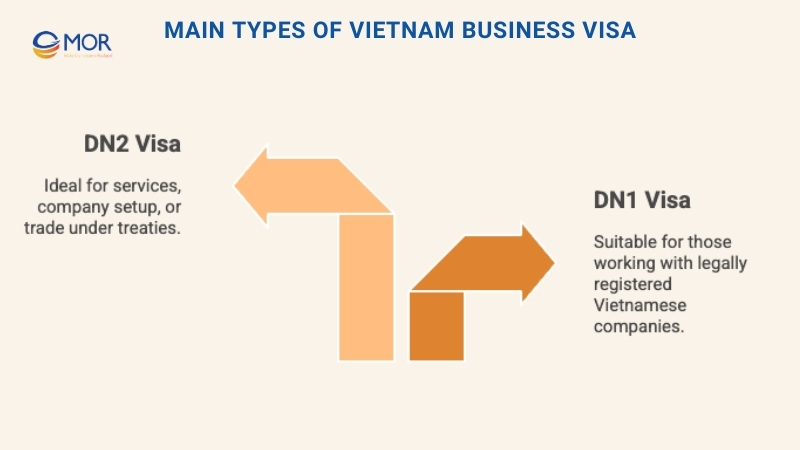
DN1 Visa
The DN1 visa applies to foreigners entering Vietnam to work with a company or organization that has full legal status. This includes limited liability companies, joint-stock companies, company branches, enterprises with foreign investment, or other legally registered domestic businesses. In this case, the Vietnamese business or organization serves as the official sponsor for the foreign applicant, which is mandatory for obtaining a DN1 visa.
DN2 Visa
The DN2 visa is intended for foreigners who plan to provide services, establish companies, or conduct trading activities under international agreements where Vietnam is a member. Although this visa does not tie the foreigner to one specific business or organization, sponsorship is still required. A local enterprise or agency must guarantee that the applicant is entering for legitimate business purposes and will comply with the visa terms.
Requirements to Apply for a Vietnam Business Visa
Before applying, every business traveler must understand the legal rules and paperwork involved in getting a Vietnam business visa. Meeting these requirements ensures a smooth review process and prevents delays with immigration authorities.
The scale of inbound travel is significant, as Vietnam welcomed over 17.5 million international visitors in 2024. With such high traffic, well-prepared files reduce the risk of processing issues.
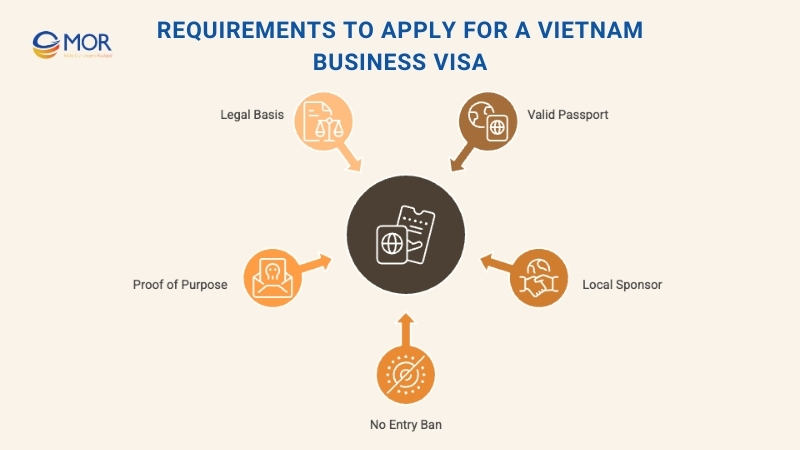
Basic Conditions
To be eligible for a Vietnam business visa, applicants must satisfy several legal conditions. These include:
- Holding a valid passport or international travel document that meets regulatory standards.
- Having a Vietnamese company or organization with recognized legal status to act as a sponsor.
- Not being listed among cases banned from entry under Article 21 of Law No. 47/2014/QH13.
- Submitting documents that clearly show the purpose of entry, such as an official invitation letter or other supporting paperwork depending on the situation.
Legal basis: Article 10 of the Law on Entry, Exit, Transit, and Residence of Foreigners in Vietnam.
MOR Software can support by issuing official invitation letters for international partners visiting our offices in Hanoi, Da Nang, or Ho Chi Minh City. This helps applicants complete the Vietnam Business Visa process more smoothly and ensures the visit aligns with legitimate business purposes such as meetings, contract signing, or conferences.
Necessary Documents
Applicants preparing for a Vietnam business visa must provide a complete set of documents to avoid delays or extra charges that could affect the overall business visa Vietnam cost. Required papers include:
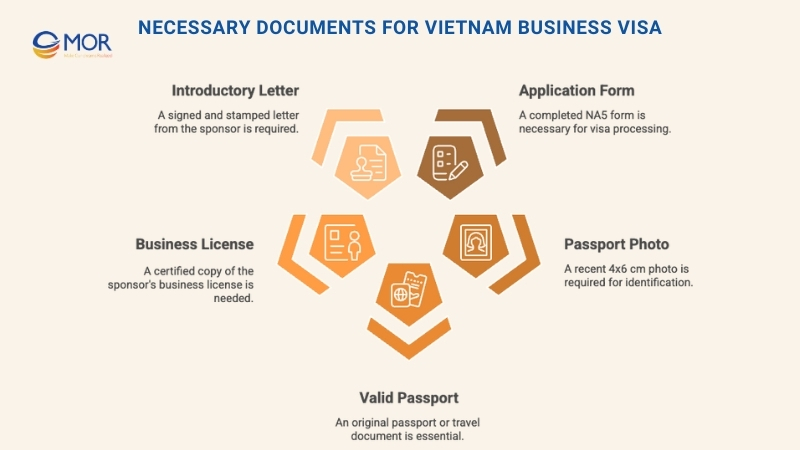
- Completed visa application form for issuance or extension of temporary residence (Form NA5).
- One recent passport-sized photograph, measuring 4 x 6 cm.
- Original passport or valid international travel document of the applicant.
- Certified copy of the business license or official decision on the establishment of the sponsoring organization.
- Letter of introduction stamped and signed by the authorized representative of the sponsoring enterprise.
Legal basis: Item 5, Section B, Part II of the administrative procedures amended and supplemented in the field of entry-exit management under the Ministry of Public Security, issued with Decision 6968/QĐ-BCA in 2022.
Differences Between Vietnam Business Visa vs Tourist Visa
A tourist visa is intended for travelers who wish to enter Vietnam for leisure, family visits, or sightseeing. This type of visa falls under the DL code and generally allows a stay of up to 90 days, either as a single-entry or multiple-entry visa.
The application process is usually simple, requiring only a valid passport, recent photos, and in some cases, proof of onward travel or accommodation. Fees are lower, and processing is faster, especially for applicants eligible for online e-visas. Still, a tourist visa comes with restrictions, as it strictly forbids any form of business activity or income generation in Vietnam.
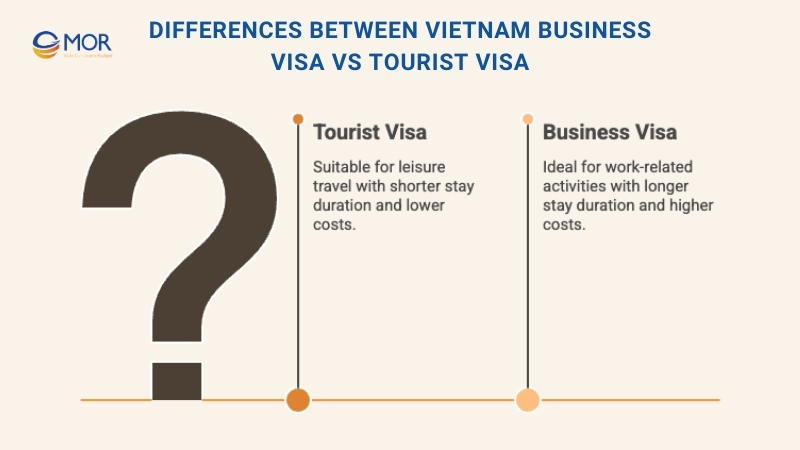
A Vietnam business visa is intended for foreigners visiting the country for work-related purposes, including meetings, contract negotiations, or market surveys. It falls under DN1 and DN2 categories, which vary based on the nature of the business activity. To apply, sponsorship from a Vietnamese company or organization is mandatory, along with supporting documents such as a guarantee or invitation letter.
Processing times are longer, and fees are higher due to additional verification requirements. Yet, this visa type grants official recognition when meeting partners, attending conferences, or exploring commercial opportunities.
For international partners considering how to get a business visa for Vietnam, it provides the right legal status for conducting business but does not replace the need for a work permit if employment is planned.
Feature | Tourist Visa | Business Visa |
| Visa Code | DL | DN1 / DN2 |
| Purpose | Leisure travel, sightseeing, visiting family or friends | Business activities like meetings, negotiations, market research, attending trade fairs |
| Stay Duration | Up to 90 days (single or multiple entry) | 1 to 3 months or longer, depending on sponsorship |
| Eligibility | Most nationalities, often available as e-visa | Requires sponsorship from a Vietnamese company or organization |
| Requirements | Passport valid for 6 months, photos, application form, sometimes proof of travel | Sponsorship documents, invitation or guarantee letter, company license details |
| Processing Time | Faster, usually 2–3 working days | Longer, often 5–7 working days |
| Cost | Lower application fees | Higher fees due to sponsorship and verification |
| Work Permission | Not permitted to conduct business or employment activities | Allows business-related activities but does not replace a work permit for employment |
In short, the tourist visa is best for short stays focused on travel and leisure, while the business visa is required for those intending to engage in official work-related activities with Vietnamese companies or partners.
How to Apply for a Vietnam Business Visa
Applying for a Vietnam business visa has become much simpler thanks to online systems and clear procedures. At present, there are three main application methods: through a Vietnamese Embassy or Consulate, via visa on arrival, or using the official e-visa platform. Each method comes with specific requirements, so applicants should prepare carefully before deciding how to get business visa Vietnam.
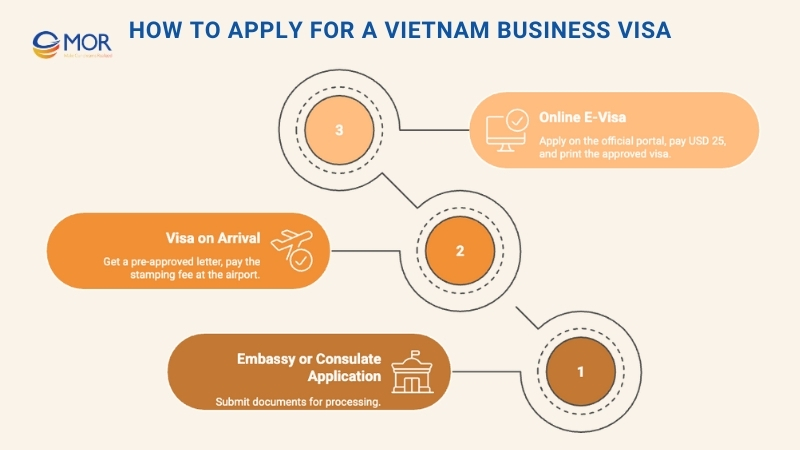
Application via Embassy or Consulate
- Step 1: Prepare the documents
- From the applicant:
- A passport valid for at least six months after arrival with one blank visa page.
- A passport-sized photo (4x6 cm) taken within six months, on a white background, no glasses, facing forward.
- A valid work permit or exemption certificate for DN or LD visa categories.
- An invitation or guarantee letter from a Vietnamese company confirming the applicant is invited for business activities such as meetings, conferences, or short-term projects.
- From the inviting or sponsoring enterprise:
- Notarized copy of the company’s business registration certificate.
- Entry request for foreigners to Vietnam (Form NA2).
- Vietnam visa application form (Form NA5).
- Seal and signature sample registration (Form NA16).
- From the applicant:
- Step 2: Submit the documents
- Applicants can submit the completed file to the Vietnamese Embassy or Consulate in their country of residence, or directly at a Vietnam Immigration office if already in Vietnam.
- Northern office (Hanoi): 44-46 Tran Phu Street, Ba Dinh, Hanoi – Tel: 02438257941
- Central office (Da Nang): 7 Tran Quy Cap Street, Hai Chau, Da Nang – Tel: 02363822381
- Southern office (Ho Chi Minh City): 333-337 Nguyen Trai Street, Ward 1, Ho Chi Minh City – Tel: 02839202300
- Step 3: Pay the fee and wait for results
- The application fee ranges from USD 25 to 50 depending on the visa’s validity and number of entries.
- Processing through an Embassy usually takes 3 to 5 working days. Once approved, the applicant receives an entry approval letter from the Vietnam Immigration Department. Using this letter, the visa can be issued and stamped into the passport at:
- International airports
- Land border checkpoints
- The Vietnamese Embassy or Consulate where the application was filed
Vietnam Business Visa on Arrival
Similar to the tourist visa process, travelers who wish to obtain a Vietnam business visa on arrival must first secure a visa approval letter issued by a licensed Vietnamese agency before departing for their trip. Without this document, entry will not be granted.
- Required Documents
- An official pre-approved visa letter issued by a Vietnamese agency.
- A valid passport with at least six months of validity left upon entry and two blank pages for stamping.
- Completed visa application form.
- Two identical passport photos (4x6 cm) taken within six months, white background, no glasses, facing forward.
- Valid work permit or exemption certificate for DN or LD visa categories.
- Invitation or sponsor letter from a Vietnamese company confirming the purpose of the visit, such as business meetings or conferences.
- Stamping fee paid in cash at the airport.
- Application Steps
- Step 1: Request a pre-approved visa letter from a Vietnamese agency before traveling.
- Step 2: Once the approval letter and application form are received, print and complete them.
- Step 3: Upon arrival at one of Vietnam’s international airports, present the approval letter, filled application form, and all supporting documents. Pay the stamping fee in cash to have the visa issued and placed in your passport.
(*) Currently, eight international airports process Vietnam business visa on arrival applications: Noi Bai (Hanoi), Cat Bi, Da Nang, Cam Ranh, Lien Khuong, Phu Quoc, Can Tho, and Tan Son Nhat (Ho Chi Minh City). This process is one of the most common answers for foreigners asking how to get Vietnam business visa quickly when traveling for work purposes.
Vietnam Business Visa Online (E-visa)
Both the foreign applicant and the inviting or sponsoring company in Vietnam can complete the application for a Vietnam business visa online. The process is simple and can be managed in four clear steps:
- Step 1: Prepare the documents
- A passport with at least six months’ validity remaining.
- A scanned copy of the passport data page.
- A recent passport photo (4x6 cm) taken within six months, white background, no glasses.
- Temporary residential address in Vietnam.
- A valid international debit or credit card for payment.
- Planned entry and exit dates, along with one of the 33 designated entry ports that accept e-visas.
- A valid email address for confirmation and updates.
- An official invitation or sponsorship letter from a Vietnamese business confirming the purpose of the visit.
- Step 2: Submit the application
- Go to the official E-visa website at https://evisa.xuatnhapcanh.gov.vn/web/guest/trang-chu-ttdt and complete the form with the required details. Select “Business Activities” as the travel purpose. After submission, you will receive a registration code.
- Step 3: Pay the fee and wait for results
- The processing fee is currently USD 25 for a one-month single-entry business e-visa.
- Step 4: Receive the visa
- Use the registration code, email, and date of birth on the E-visa website to check the status. If approved, the visa will be available in PDF format. Print the document and present it at your chosen entry checkpoint upon arrival in Vietnam.
For many international partners exploring how to get a business visa for Vietnam, the online application is one of the most straightforward and cost-effective options.
How to Extend a Vietnam Business Visa
Foreigners holding a Vietnam business visa can extend their stay without leaving the country by applying directly at the nearest Immigration Office. The process involves four key steps:
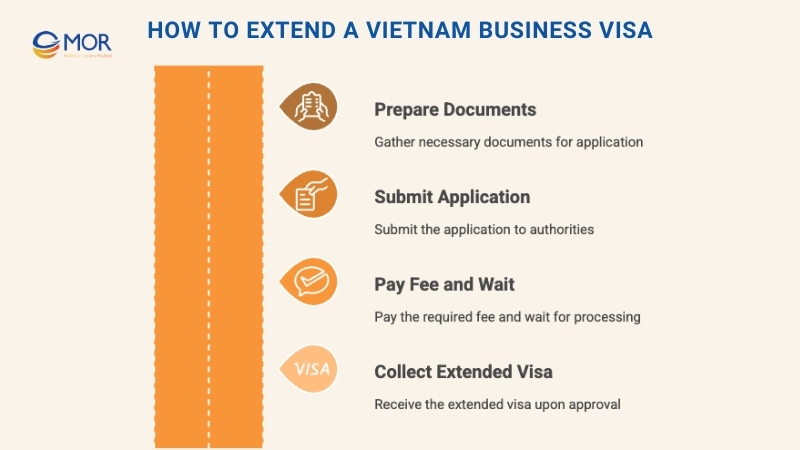
- Step 1: Prepare the documents
- An invitation or sponsorship letter from the Vietnamese company.
- Legal paperwork of the sponsoring enterprise, such as a business license and seal certificate.
- A passport valid for at least six months at the time of the extension.
- Completed application form for visa issuance or stay extension (Form NA5).
- Confirmation of temporary residence issued by the local police or a printed copy of the online confirmation.
- Step 2: Submit the documents
- Applications can be filed at one of the three main Immigration offices in Hanoi, Da Nang, or Ho Chi Minh City. Alternatively, applicants may submit to the provincial Immigration Office where they reside.
- Step 3: Pay the fee and wait
- The extension fee is USD 10. Processing typically takes about five working days from the date the Immigration Department receives the complete application and payment.
- Step 4: Receive the visa extension
- Once approved, the applicant must return to the Immigration Office as scheduled to collect the updated visa showing the new expiration date.
Processing Times and Fees for Vietnam Business Visa
Knowing the timeline and expenses for a Vietnam business visa helps applicants plan their trip without last-minute surprises. Both processing times and fees can vary by application method.
Standard Processing Time
The waiting period for a Vietnam business visa depends on the method of application. Each option follows its own review steps and approval schedule.
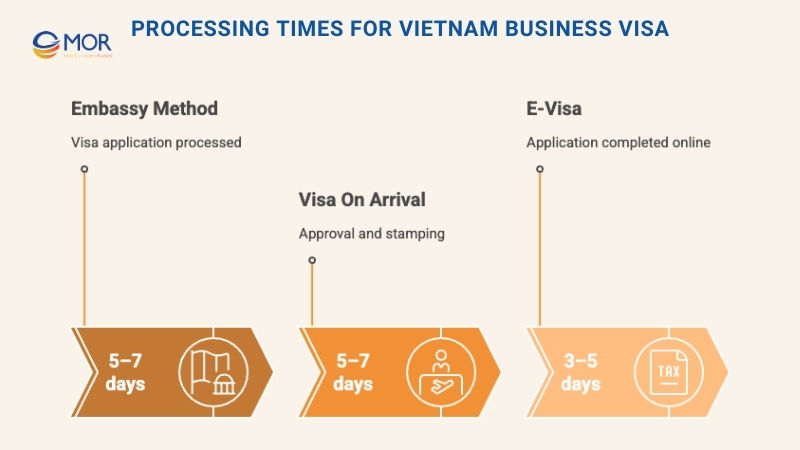
- Applying for a Vietnam business visa through an Embassy or Consulate generally takes 5–7 working days to issue the sponsor or invitation letter, plus a few extra days for final approval at the Embassy.
- For a Vietnam business visa on arrival, applicants should expect 5–7 working days to obtain the approval letter, followed by about 30 minutes to 1 hour at the airport to complete the stamping process.
- The electronic Vietnam business visa (E-visa) is usually processed within 3–5 working days.
Fee Breakdown
The total cost of a Vietnam business visa varies based on where and how the application is submitted. Breaking down the fees helps applicants prepare their budget more accurately.
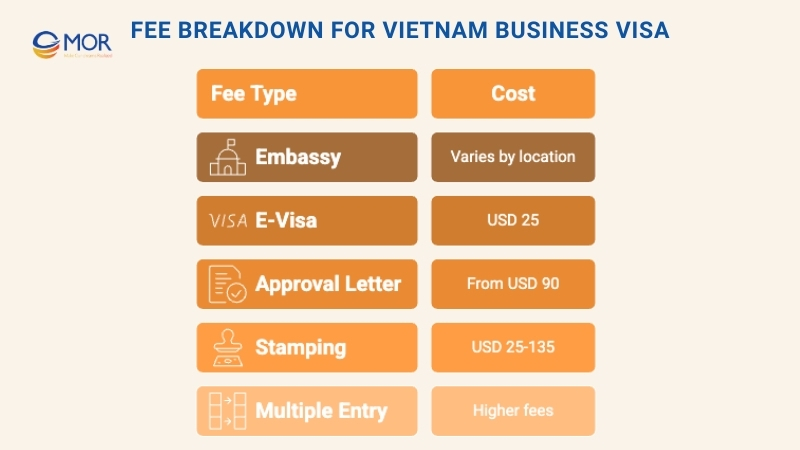
- The cost of a Vietnam business visa at an Embassy or Consulate varies by location, so applicants should confirm the exact amount directly with the office handling their case.
- The current government fee for a business e-visa is USD 25, covering a one-month, single-entry visa. Fees may change if longer stays or multiple-entry e-visas become available in the future.
- For a visa on arrival, there are two types of costs: the agency service fee for the approval letter (starting around USD 90, depending on the agency) and the stamping fee paid directly to the Immigration Department at the airport. The stamping fees are:
- 1 month, single-entry: USD 25
- 1 month, multiple-entry: USD 50
- 3 months, single-entry: USD 25
- 3 months, multiple-entry: USD 50
- 6 months, multiple-entry: USD 95
- 12 months, multiple-entry: USD 135
Countries Exempt From Vietnam Business Visa
According to Resolution No. 32/NQ-CP, the countries exempt from Vietnam’s business visa are the Russian Federation, Japan, South Korea, Norway, Finland, Denmark, Sweden, the United Kingdom, France, Germany, Spain, Italy, Belarus, and officials of the ASEAN Secretariat.
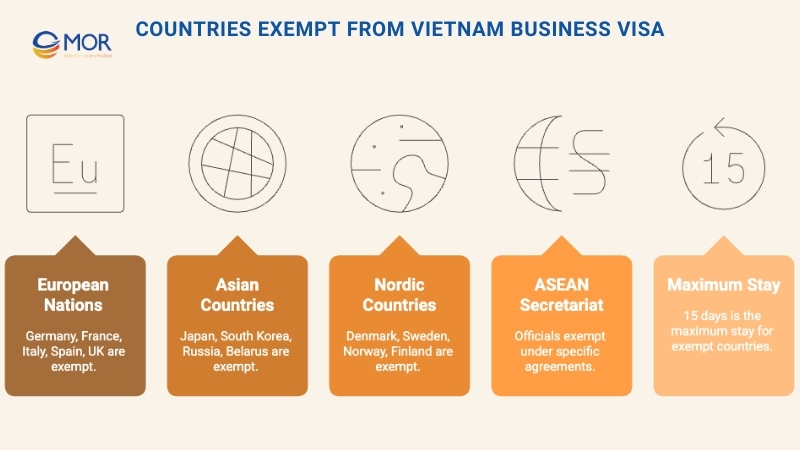
List Of Countries Exempt From Vietnam Business Visa
Based on Resolution No. 32/NQ-CP, Vietnam has applied a visa exemption policy for citizens of 13 countries, specifically for entry with commercial benefits, with a maximum stay not exceeding 15 days.
Additional Exemptions
In addition, foreigners who are citizens of ASEAN countries (bilateral visa exemption) and holders of APEC business travel cards are entitled to the following visa-free stay:
COUNTRY | MAXIMUM VISA-FREE STAY | VALIDITY PERIOD |
| Germany | 15 days | Until March 14, 2025 (subject to extension as per regulations) |
| France | 15 days | Until March 14, 2025 |
| Italy | 15 days | Until March 14, 2025 |
| Spain | 15 days | Until March 14, 2025 |
| United Kingdom of Great Britain and Northern Ireland | 15 days | Until March 14, 2025 |
| Russia | 15 days | Until March 14, 2025 |
| Japan | 15 days | Until March 14, 2025 |
| South Korea | 15 days | Until March 14, 2025 |
| Denmark | 15 days | Until March 14, 2025 |
| Sweden | 15 days | Until March 14, 2025 |
| Norway | 15 days | Until March 14, 2025 |
| Republic of Finland | 15 days | Until March 14, 2025 |
| Republic of Belarus | 15 days | Until March 14, 2025 |
Conclusion
Securing a Vietnam business visa is an important step for international partners who plan to collaborate, attend events, or explore investment opportunities in the country. By understanding the application methods, fees, and extension rules, the process becomes much easier to manage. MOR Software supports partners by providing invitation letters and guidance for smooth visa procedures. Contact us today to learn how we can assist with your Vietnam business visa application.
Rate this article
0
over 5.0 based on 0 reviews
Your rating on this news:
Name
*Email
*Write your comment
*Send your comment
1